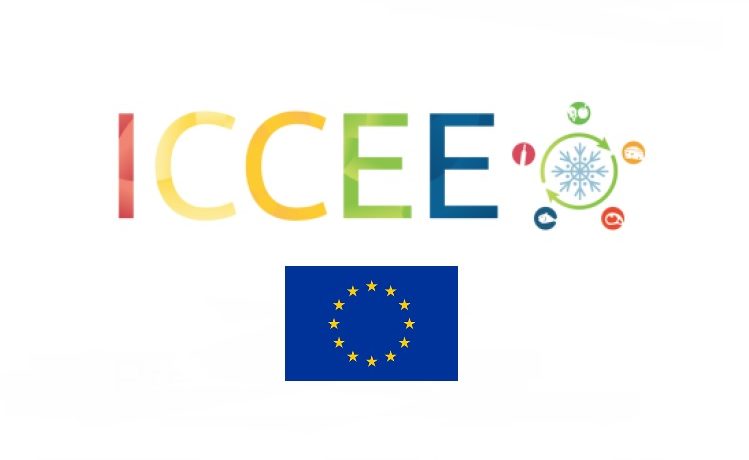Cold chains energy efficiency for the food and beverage sector. ICCEE, a project funded by the Horizon 2020 programme, launches several tools and platforms developed by the project partners these past months, all with one goal: increasing the energy efficiency and sustainability culture of industrial companies, warehouse, cold storage and logistic operators, providing keys to improve their core business by easily revising their operations.
ICCEE is a 3-year project launched in September 2019 and funded by the European programme Horizon 2020, which aims at turning energy efficiency opportunities of food and beverage companies into actual investments and allowing them to find opportunities to improve the cold chain with a holistic approach.
With this aim, a full capacity building programme dedicated to improving the energy performance through direct training and e-learning was designed and created by a team of experts coming from both the private and public sector. The trainings, organised all across Europe since 2020, have allowed to engage a lot of stakeholders from the value chain. To share knowledge on industrial refrigeration energy efficiency and increase the number of participants receiving this knowledge, an e-learning platform was launched by ICCEE, available on the project website.
8 more interactive and digital EU workshops are now in the pipeline until end of 2021, to introduce stakeholders some of the tools developed to further support the industry on their path to sustainability and increased energy efficiency and allow them to put them to use. Each workshop will define in depth the three main energy efficiency measures resulting from the tools’ application, as well as the funding opportunities to finance them. They will also allow to focus on one subsector: beverage, dairy products, fish, frozen food, fruits and vegetables, meat, and HORECA.
The 6 ICCEE tools, just released on the project website, allow users to add their own data and sector characteristics, to carry out benchmarking and what-if analyses to reduce uncertainties and risks, evaluate the cost-benefits of energy efficiency measures across the supply chain through an holistic approach, prioritize measures to improve the economic and energy performance of the whole supply chain, assess non-energy benefits, such as enhanced competitiveness, reduced maintenance, improved working environment, and finally be informed about existing funding opportunities for energy efficiency measures. Tutorial videos are provided to navigate the users through the tools and allow them to upgrade their skills.
Another platform, the Industry Informative Network, was created to increase stakeholder exchange, fostering the link between various market stakeholders and bridging the gap between demand and supply. It comprises three sections: a community of practitioners for discussion, a library and a technical repository to bridge the gap between market supply and demand – the catalogue of innovations. The platform will be populated over time with manuals, brochures, technical notebooks and other available information on legislative and technical developments for the cold supply chains in the food and beverage sector and invites stakeholders to contribute.
Finally, two major project events have been announced where stakeholders will hear about these tools and the project work: the first event, October 19, builds on the results of 7 EU-funded projects: DEESME, E2DRIVER, INNOVEAS, SMEmPOWER, SPEEDIER, ICCEE and Triple-A, and is part of the European Sustainable Energy Week extended programme. It is organised as mid-term event of ICCEE and will provide
The ICCEE project has received funding from the European Union’s Horizon 2020 research and innovation programme under grant agreement no. 847040, guidelines and good practices to implement energy efficiency solutions, focusing on the challenges, opportunities, new forms of actions and regulations to enhance the role of SMEs in energy transition.
The project final conference will be organised during the World Sustainable Energy Days, in Wels, Austria, beginning of March 2022.
ICCEE (Improving Cold Chain Energy Efficiency, Sept 2019 – August 2022) will facilitate SMEs in the cold chains of the food and beverage sector to undertake energy efficiency measures (EEMs) after carrying out supply chain energy audits. The focus on the cold chains of the sector is due to the significant energy requirements (refrigerated transport, processing and storage) with large potentials for savings. The implementation of an holistic approach, shifting from the single company perspective to the chain assessment, lead to increased opportunities for EEMs. To enable the update of EEMs, ICCEE will a) implement and apply an analytical energy efficiency tool to support and facilitate decision-making at different company organisational levels and b) launch a capacity building program towards staff and relevant stakeholders and a community dedicated to support a change in energy culture of the sector. The feasibility of EEMs will be evaluated by considering economic, environmental and social impacts encompassing their entire life cycle and the entire supply chain. Non-energy benefits and behavioural aspects will also be addressed and recommendations on financing schemes for SMEs will be assessed.

